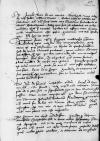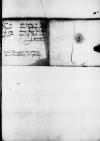Letter #763
Cornelis DE SCHEPPER to Ioannes DANTISCUSBruges, 1532-03-11
English register:
De Schepper received a letter from Dantiscus ca. March 8. He regrets Dantiscus’ sudden departure. He had every intention of coming to Antwerp to take leave of him, but it was not to be.
He has his doubts about the rumour concerning the reason for Dantiscus' precipitous departure, viz. that the Emperor [Charles V] had arrived in Regensburg and would be leaving from there soon. Moreover, he thinks himself well placed to assess such rumours. No matter when Dantiscus arrives at court, he will find the situation unchanged.
The letters of De Schepper and Dantiscus to the Lord of Beveren remain unanswered. De Schepper only asked him to indicate a meeting place. Times are too hard for De Schepper to travel around without being sure where he can find him. He would rather not return to the Emperor before having consulted the Lord of Beveren. De Schepper is disappointed in Gemma [Frisius] [who failed to join Dantiscus’ retinue]; he is pleased that Campensis is still accompanying Dantiscus, and wonders whether they will stay in Cologne. Unless the Emperor commands him otherwise he himself will depart for the court on April 8. He sends his maternal half-brother as bearer of this letter. He plans to keep the boy with him to gain experience, but as he is not used to De Schepper's fast way of travelling on horseback, he asks Dantiscus to let him travel by foot along with his retinue. He has recommended him to Dantiscus’ steward Petrus [Mirabilis]. As soon as they meet en route to the imperial court, De Schepper will take his brother back into his company. When Dantiscus extends his stay in Cologne or with the Prince-Bishop of Liège [Erard de la Marck], De Schepper will probably overtake him.
He sends greetings from his family in Bruges. His stepdaughter Catharina is suffering from a severe attack of fever. Mark Laurijn was disappointed not to meet him in Bruges. He had prepared a fine piece of earthenware as a gift. De Schepper sends his regards to the Cardinal [Erard de la Marck].
| received Regensburg, 1532-04-06 Manuscript sources:
Auxiliary sources:
Prints:
| ||||||||||||||
Text & apparatus & commentary Plain text Text & commentary Text & apparatus Excerpts concerning Dantiscus' travels
Reverendissimo in [Chr]isto Patri et Domino, domino
Salutem plurimam.
cf.
Imprimis scribis te a
De
Interea mitto ad te latorem praesentium,
Novarum rerum hic nihil est.
Et bene vale, Domine honorandissime.
Ex
Reverendissimae Dominationis Vestrae humillimus inservitor
[2 ] About the time Dantiscus left Antwerp: cf. 1st and 2nd paragraph: Michael De Vriendt is the messenger; Dantiscus must have announced in this letter his departure and his intention to follow the court to Regensburg
[3 ] Annotation needed on the topic of the contacts between Scepperus and Beveren
[4 ] Note about Gemma Frisius not following Dantiscus to Poland; cf. De Vocht Hist. Trilingue and more recent publications on Gemma Frisius (Fernand Hallyn etc.)
[5 ] Note, ref. to De Vocht, Trilingue
[6 ] In 1532 Quasimodogeniti Sunday fell on April, 7
[7 ] Half-brother of Cornelis De Schepper


